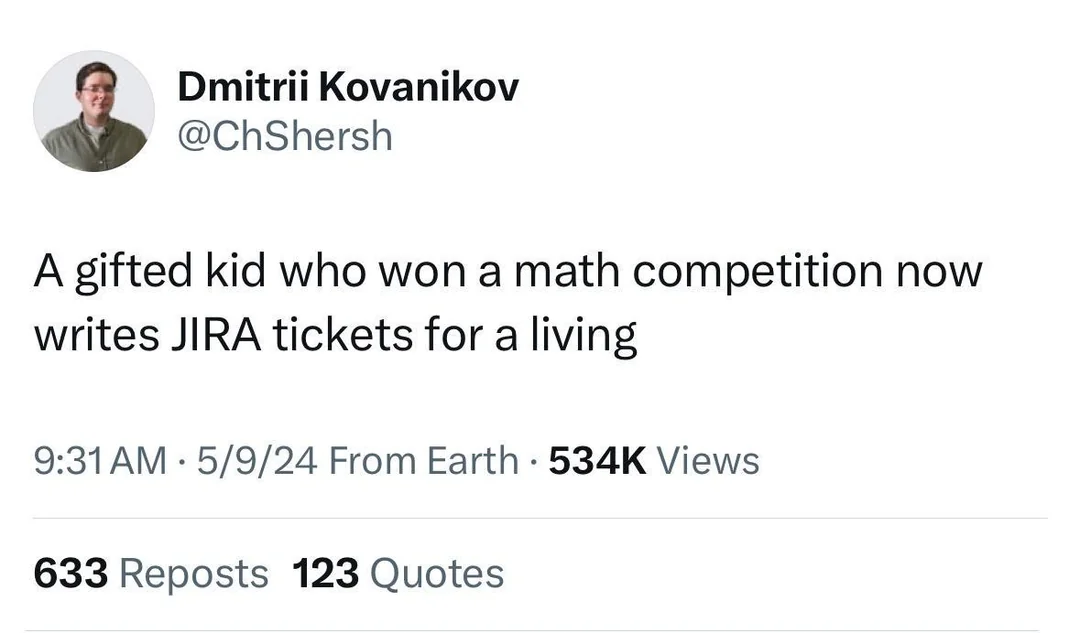this post was submitted on 12 May 2024
870 points (99.4% liked)
Programmer Humor
34156 readers
26 users here now
Post funny things about programming here! (Or just rant about your favourite programming language.)
Rules:
- Posts must be relevant to programming, programmers, or computer science.
- No NSFW content.
- Jokes must be in good taste. No hate speech, bigotry, etc.
founded 5 years ago
MODERATORS
you are viewing a single comment's thread
view the rest of the comments
view the rest of the comments

No, I was actually in a class specifically for gifted children.
However, this was over 20 years ago and back then, this was a relatively new concept in my region. That meant the class had to be padded with "regulars" and the special treatment we got, was rather limited. Looking back, it seemed like they dropped the idea almost completely after 9th grade or so.
And even today I'm pretty sure there's no comprehensive testing going on. So a ton of smart children get labelled as having ADHD or just as delinquents if they're from a "bad" background.
Funny thing is, Germany actually did have a three tiered school system for decades, where after elementary the children were separated by "performance", but since this country is laughably bad at creating equal opportunities, this de facto became a class filter. Parents are academics? Off to the Gymnasium with you! Parents are poor/migrants? Well, Hauptschule will have to do. Good luck at being underemployed for life.
Your last paragraph seems misinformed.
https://en.m.wikipedia.org/wiki/Gymnasium_(Germany)
I myself went to a public Gymnasium and can still remember that among my classmates we had a wide range re "parent income and status".
Literally from:
I literally:
And even if you go to "Hauptschule", that's not the end of education. One can still do what's called "M-Zweig", which gets you the equivalent degree of "Realschule". Then one can go to "FOS", which gets you a degree close to that of Gymnasium. It at least allows for going to a "university of applied sciences", which is less geared towards academics and more towards industry. Still can get you your masters degree or if a doctors degree if one really wants that and partners with an "academic university" (AFAIR).
Some children simply take that other route. Still, it comes down to ability of the child. Of course, having a non-supportive environment that doesn't believe in achild can make things harder on it. Some children might actually be motivated by "potentially escaping that".
But to say this education system is a "class filter" is just wrong.
You seem to have a much too positive view of our system: https://www.das-parlament.de/inland/bildung/wie-gerecht-ist-das-deutsche-bildungssystem
Maybe I have bit too positive outlook on this, yeah.
But that article also emphasizes a lot (first half) that a child's environment simply matters a lot. Esp. having parents that have higher education themselves and are there for the child to support it regarding learning outside of school can make a big difference. And this isn't just about the first couple years before elementary school (what article says re "Wortschatz"). Esp. the ongoing school period thereafter. E.g. "Does it make a difference in a child's household if parents can speak English when trying to learn English?" - of course it does!
The point on "Brennpunktschulen" is also very environment driven. I'm not saying that "Lehrermangel" isn't real, or that having this system of three school paths starting from 5th grade is the best invention ever.
But one can't put all the blame on the school system, when "what happens outside of school" has such a big impact on a child.
You can absolutely blame the schools, if so many other countries manage to do better.
You're basically blaming the children.
TBH, I don't know much about school systems of other countries. Just reading horror stories of the US education system re student loans at times. So can't really argue that point with you.
But I'm not sure what made you think I'm blaming the children. Not once did I make a remark that would suggest that.
So let me be clear: Children, while they are still considered children, really can't be blamed. As they become adolescents, then slowly, but ever increasingly more, their own viewpoints and actions will have an impact on how their education is going (esp. true if a child goes a lot further in education than their parents ever did).
Rather there's some blame to be put on the social environment and the child's parents. E.g. it's not the fault of the education system if child's parents are divorcing while the kid is in Kindergarden and the child then has to switch schools multiple times, not because the child is problematic or because the education system is pushing the child around. No, chances are most of the blame is on the parents then.